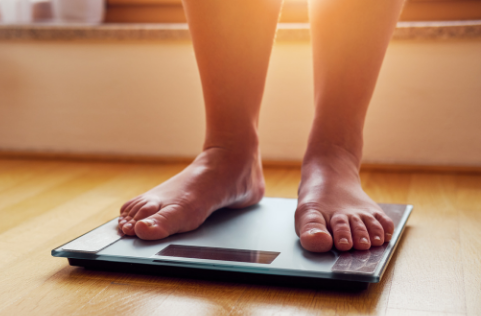In today's health-conscious world, self weighing is often seen as a crucial step towards maintaining a healthy lifestyle. However, the seemingly harmless act of stepping on the scale can sometimes do more harm than good.

let’s first dive into the idea that weight = health.
It’s pretty commonplace in the medical world that your weight and body shape and size is equivalent to your health status. Here at NourishRX, we believe in the idea that individuals can achieve a healthy status regardless of the number on the scale, that BMI is not the gold standard of health status and that focusing in on behaviors such as: adequate and varied intake, joyful movement, stress management and gentle nutrition can have a much greater impact on overall well-being and health than being fixated with the number on the scale.
With that being said, let's explore the potential downsides of self-weight checking and how it can negatively impact your mental and physical health.
why self weighing may do more harm than good
Ignoring hunger cues
One significant issue with frequent self weighing is that it can lead you to ignore your body's natural hunger cues. When you're focused on the numbers on the scale, you may start to prioritize weight over well-being. This can cause you to skip meals or adopt restrictive eating habits, ignoring when your body genuinely needs nourishment. This can lead to a restrict-binge pattern that is very distressing.
Far too often we have clients who are so frustrated with their chaotic eating patterns after work or in the nighttime. After talking further, it becomes clear that restriction during the day is leading your body to feel extreme hunger, leading to a quick pace of intake, wanting larger quantities of food, and reaching for the options that are the most convenient and available at the moment. Once they start to adapt more consistent eating patterns throughout the day and tune into their bodies natural cues, they no longer feel chaotic around food at night.
Listening to your hunger cues is essential for maintaining a balanced diet and a healthy relationship with food.

Worsening Body Image Thoughts
Regularly engaging in self weighing can also contribute to increased body dissatisfaction and poor body image.
When the scale becomes the primary measure of your self-worth, fluctuations in weight can lead to negative feelings about your body. And, let’s be clear, your weight is *meant* to fluctuate. Whether it’s fluid status, bowel irregularity, stress, lack of sleep (the list goes on), there are so many factors that could contribute to a fluctuation in the number on the scale on a day to day (and even hour to hour) basis.
However, the constant scrutiny of the changing number can erode your self-esteem and foster an unhealthy obsession with achieving an "ideal" weight. This can be both unattainable and detrimental to your overall well-being.
Increased Stress Levels
The act of self weighing can increase stress levels, particularly regarding weight and food choices. When you're constantly monitoring your weight, everyday eating can become a source of anxiety.
This stress can manifest in various ways, from overanalyzing every meal to feeling guilty about enjoying food. Such anxiety can lead to an unhealthy relationship with food and your body as well as physical manifestations such as: elevated cortisol and insulin levels that have their own impact on the body and physical well-being.
Increased food preoccupation
Frequent weighing can cause you to think about food more often and become obsessive.
The pressure to maintain or achieve a certain weight can dominate your thoughts, making it difficult to focus on other aspects of life. This preoccupation with food and weight can lead to disordered eating patterns, where food is no longer enjoyed but rather viewed as a tool for weight control.
finding a healthier approach
To foster a healthier relationship with your body and food, consider the following alternatives to regular self-weighing:
- Listen to Your Body: Practice tuning into your hunger and fullness cues. Your body is smart! It knows how much you need. However, if you are in eating disorder recovery and/or recovering from chronic dieting, your hunger and fullness cues may be a little out of whack. Try sticking with a more consistent schedule of intake (maybe try eating something every 2-3 hour) until you feel that you can more accurately connect to what your hunger and fullness feels like.
- Focus on How You Feel: Instead of concentrating on the number on the scale, focus on how your body feels. Are you energetic? Are you able to perform daily activities without discomfort?
- Celebrate Non-Scale Victories: Recognize achievements that aren't related to weight. Celebrate improvements in your fitness level, strength, or mental well-being.
- Seek Professional Support: If you find that your relationship with your body and food is causing significant distress, consider seeking support from a healthcare professional or a therapist who specializes in eating disorders and body image issues.

how nourishrx can support you
While the number on the scale is a piece of the puzzle when it comes to overall health, it's essential to recognize when self-weight checking might be doing more harm than good. Ignoring hunger cues, increasing body dissatisfaction, elevating stress levels, and fostering obsessive thoughts about food are all potential downsides of regular self-weighing.
But, the good news is - there's another way to achieve health without obsessing about the number! By adopting a more mindful and holistic approach to health, you can cultivate a positive relationship with your body and food, leading to improved overall well-being.
Our team of Intuitive Eating dietitians wants to be there to support you! Drop us a line to see how our services match your needs.
Remember, your worth is not determined by the number on the scale. Focus on nourishing your body, respecting your hunger, and embracing the journey towards a healthier, happier you.
Comments Off on Should I Weigh Myself Every Day? A Note on Self Weighing